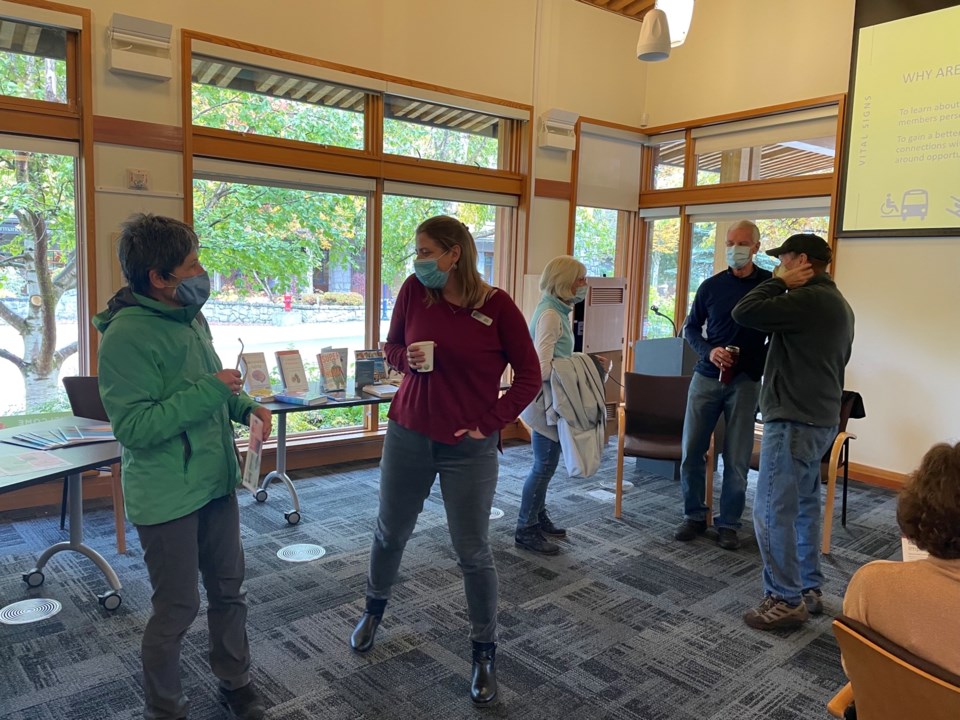A new report from the Whistler Community Foundation’s (WCF) Vital Signs initiative paints the fullest picture yet of just how drastically the pandemic impacted the resort across several sectors.
The WCF released its COVID-19 Impact Snapshot during an open house held at the Whistler Public Library on Wednesday morning, Oct. 13, held in conjunction with Vital Signs Week across Canada. Vital Signs aims to foster grassroots conversations, while gathering data and using it to illustrate how a community is faring overall.
The idea for a COVID-19 Impact Snapshot came about after hosting virtual Vital Café events within the last year covering topics like youth health and wellness and parenting during the pandemic, explained Libby McKeever, WCF Vital Signs project coordinator. “We also saw that there was a huge need to talk about COVID” more generally, she said.
Added WCF executive director Claire Mozes, “We realized when we were talking at our Vital Cafés how COVID has just—and we all know this—has impacted everybody in some way or another, across industry, across ages, across every demographic, so it felt important to collect some data on this past year and see [if it can] tell us a little bit about what the community’s gone through.”
The snapshot chronicles declining mental health as the most prevalent theme of the pandemic. According to the report, 70 per cent of young adults aged 19 to 30 who responded to Whistler's Communities that Care survey earlier this year experienced worsened mental health, while 65 per cent reported experiencing anxiety.
Other notable statistics included in the report detail COVID-19’s massive impact on tourism, Whistler’s main economic driver. The resort drew, on average, 342 visitors per day in April 2020, and 1,794 visitors per day in April 2021, the report states. That’s down significantly from the average of 19,942 visitors per day Whistler welcomed in April 2019.
“We all knew how quiet last year was. But [to see] that stat, on paper—for me that was one that really stood out,” said Mozes.
Of the 809 Whistler residents aged 18 to 30 who responded to the survey, 38 per cent of young adults lost their jobs due to the pandemic, while 62 per cent collected government benefits due to full or partial job loss. Meanwhile, Whistler Personnel Solutions received 42 per cent fewer job applications in 2021 compared to 2020. The Whistler Food Bank saw a 52 per cent increase in visits in 2020, with 2021 visits on track to be even higher, according to the report.
“To see those tourism stats and then just to so totally understand that ripple effect—people don’t have jobs, people who never ever would have lined up for the food bank are there, people who were brought over from other countries who had visas attached to workplaces and all of a sudden didn’t have work, couldn’t go home and they’re lined up with families,” said McKeever. “The depth and the breadth of how it affected everybody … I don’t think anybody quite understood how it could have cut so deep.”
The report also includes data about the number of crimes reported, housing costs and availability, volunteer hours lost, and Whistler Search and Rescue call-outs, as well as first-hand anecdotes proving how local arts, culture and community organizations managed to adapt.
It’s not all doom and gloom: the COVID-19 Impact Snapshot also highlights a 20 per cent reduction in Whistler’s total estimated community-wide greenhouse gas emissions in 2020, while use of the library’s online courses and e-book site rose 228 per cent and 182 per cent, respectively.
“There are some nuggets in there that are good. Even if you think about Food Bank, and, OK, their user numbers went up greatly, but they also adapted and were able to offer delivery service for those people isolating and they didn’t have that before,” said Mozes. “Maybe that would be a great thing that they could keep going—I don’t know what their plans are, but maybe that helps other people that are bound at home for other reasons.”
Around 14 Whistlerites showed up to the library on Wednesday to join WCF staff for drop-in conversations about these pandemic-driven changes in the community’s housing, environment and social services situations.
The Impact Snapshot was funded by a community grant from the Real Estate Foundation of Whistler, and based on the United Nations’ 17 Sustainable Development Goals.
“Overwhelmingly, people were happy to have something in their hands, something tangible, where they could see at a glance what Whistler did and how [it] did” during the pandemic, McKeever recalled. The obvious connections between various sectors highlighted by the data was what seemed to strike people the most, she noted.
From a funder’s perspective, the data will hopefully encourage local organizations to recognize gaps in the community and apply for grants to fund new services to help fulfil those needs, Mozes added.




